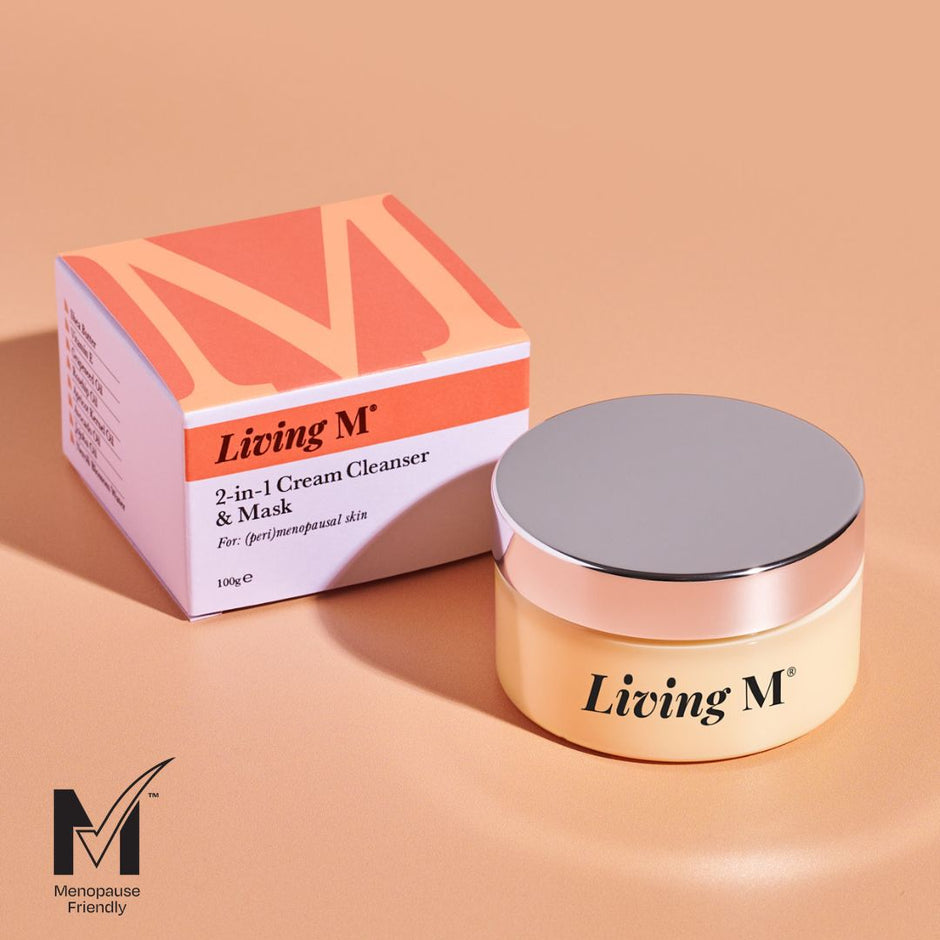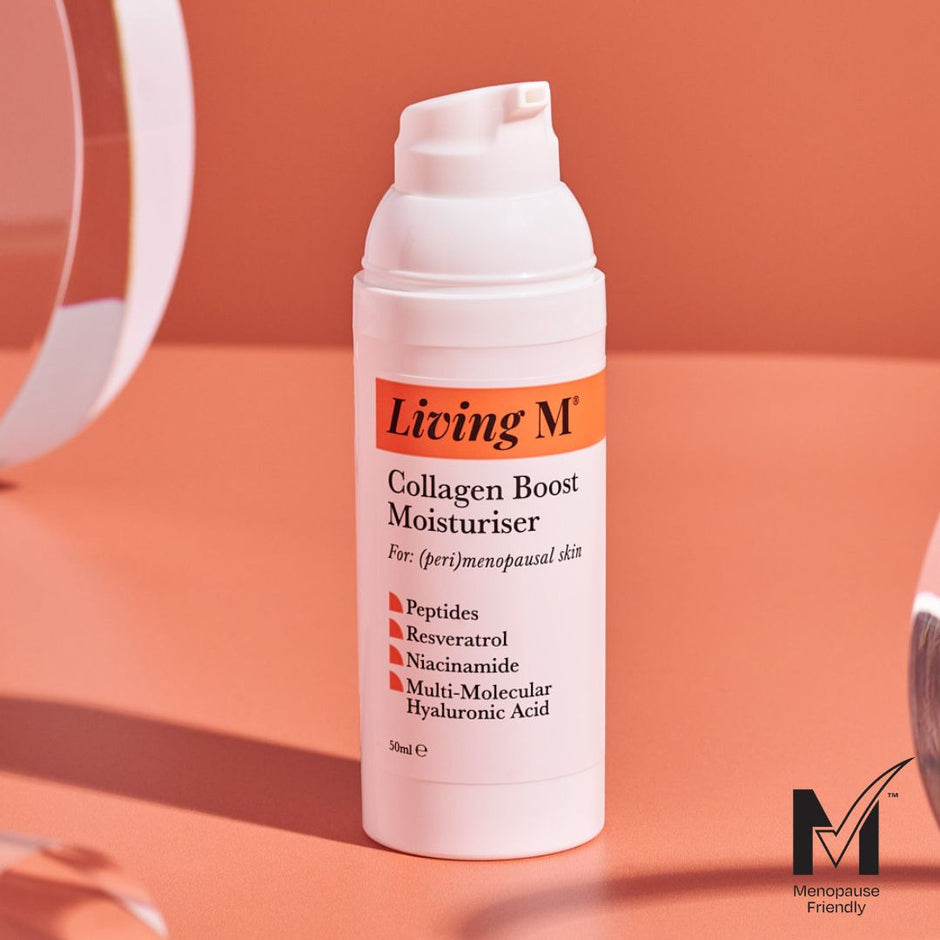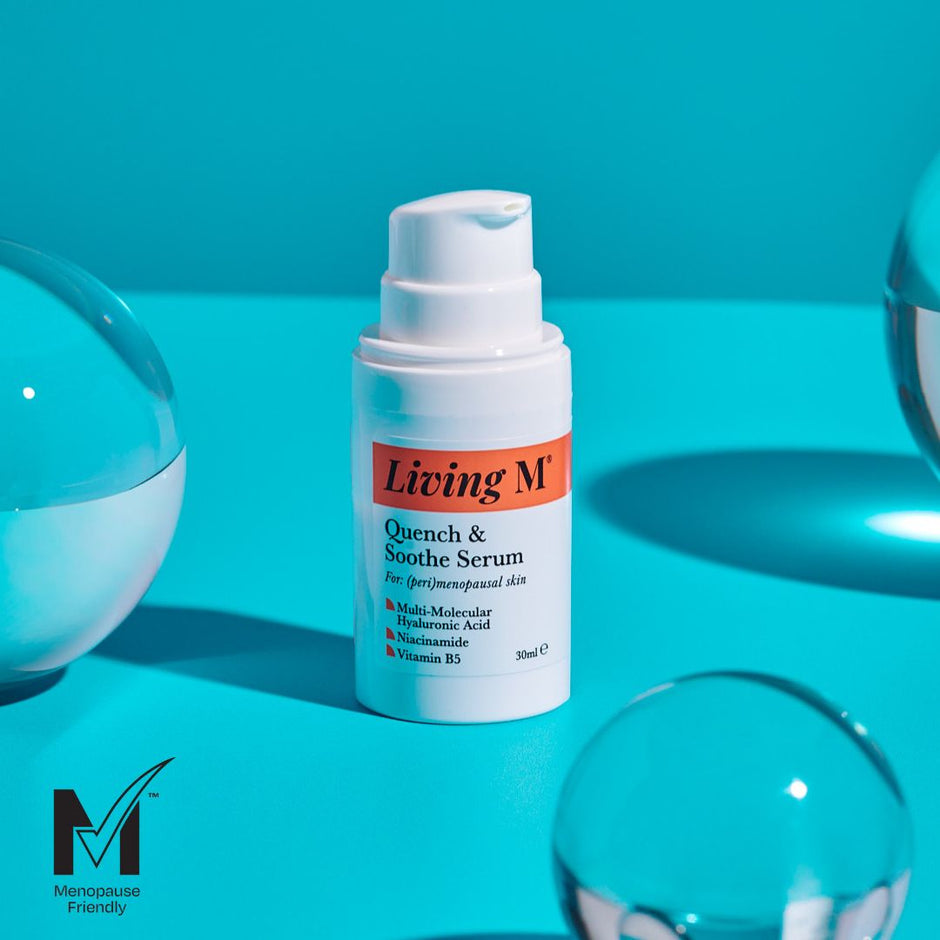8 Ways To Get Your Glow Back
Dry, dull, lacklustre skin. It’s the complaint we hear most often from our customers. It can suddenly seem as if you have lost your glow overnight. Fluctuating hormones mean big changes for our skin and the loss of that plump, dewy, radiant look is one that affects most of us. Lack of sleep and low energy and mood certainly don’t help us look and feel our best at this time of life. The good news is that there are things you can do to restore radiance but in menopause it means a more targeted approach.
What Happens to Skin in Menopause?
As our hormones start to fluctuate and decline, collagen levels will start to decrease. Collagen is the structural protein responsible for skin’s elasticity - 30% will be lost during the first 5 years of menopause. As we approach menopause, oestrogen levels decline, and collagen production slows down. Skin becomes drier and thinner with a weakened skin barrier. Cell turnover slows rapidly, and skin starts to lose its ability to hold onto water appearing less plump and radiant.
Skin can become more sensitised and prone to irritation. Hormonal imbalances can also lead to breakouts and inflammation that you may not have experienced since puberty. Your skin can be quite confused – dry and irritated on the one hand but breaking out at the same time and it can be hard to know what products are going to be right. Your skin is going through big changes which all add up to a complexion that’s dull, dry and lacking in radiance.
So How Can I Get My Glow Back?
- Go Easy On The Acids. In our 20’s and 30’ using chemical exfoliants like AHAs and BHAs is an effective way to get an instant radiance boost. The truth is, in menopause, using acids too frequently is likely going to disrupt your skin barrier. This is the protective layer that keeps moisture in. This means that far from boosting skin radiance using acids can make skin even drier and duller. The exact opposite of what you are trying to achieve. Limit use to once a week maximum and avoid harsh exfoliants like scrubs all together.
- Start using Niacinamide. We can’t sing this skincare superhero’s praises enough. Niacinamide has so many benefits for menopausal skin its hard to know where to begin (read our Menopause and Niacinamide blog for all of them) but boosting radiance without causing irritation is a big one. Niacinamide has a super effective brightening effect on skin but unlike other ingredients like Vitamin C for example it is well tolerated and won’t cause irritation, redness, or sensitivity.
- Replenish lost hydration. In menopause, your skin literally loses its ability to hold onto water resulting in dry, dehydrated skin. Look for skincare ingredients that contain hyaluronic acid – a super hydrator that can hold 1000 x its own weight in water. It acts like a sponge and draws moisture to the skin. Not all hyaluronic acid is created equal though – Living M skincare products are all formulated with multi-molecular hyaluronic acid. Which basically means different sizes of molecule. Low and mid weight molecules penetrate deep into the skin’s layers for intense below the surface hydration that lasts. Higher weight molecules give an immediate plumping effect to the skin for that dewy look we all miss.
- Use a Serum. A serum contains higher levels of active ingredients than other products so they make a bigger impact on your skin. They are usually thinner than other products so they can penetrate skin more easily and boost your complexion. Living M Quench & Soothe Serum has been created to intensely hydrate, brighten and soothe skin. Use it in the morning and again at night under your moisturiser.
- Add Phytoestrogens. Phytoestrogens in skincare basically mimic the effect that oestrogen has on the skin. Our Collagen Boost Moisturiser is blended with Resveratrol - a potent phytoestrogen and antioxidant. This absolute skincare gem is found in the skin of red grapes, it has excellent benefits for menopausal skin. As well as hydrating, brightening, and protecting skin’s natural barrier, Resveratrol functions like oestrogen to maintain collagen and moisture levels for firmer, plumper skin and a dewy complexion. If it isn’t already in your skincare products now it the best time to add it.
- Boost Your Collagen Levels. Collagen levels start to decline dramatically in menopause but there is a lot you can do to protect and boost collagen levels in your skin. Peptides are an intelligent skincare ingredient that send messages to your skin to produce more collagen and elastin, essential for supple, nourished skin. Living M Collagen Boost Moisturiser is a multi-benefit moisturiser formulated with a blend of signal peptides that stimulate collagen production in your skin.
- Nourish your skin. Your skin in menopause is going to need a more nourishing moisturiser than it has before. A lot of moisturisers for menopausal skin are very rich and highly fragranced – neither of which are going to do your skin any good. Fragrance is a known irritant and creams that are super rich can clog your pores and trigger spots and breakouts. Our Collagen Boost Moisturiser contains a blend of two super nourishing natural butters – Avocado and Cupuaçu. Known as nature’s super-moisturisers they effectively relive dryness and tightness and restore moisture levels for a radiant look. Free of fragrance, essential oils and drying alcohol which are to be avoided in perimenopause and menopause when skin becomes much more prone to irritation.
- Adopt an outside in approach. No doubt you know this already, but diet and exercise can have a huge impact on how glowing your skin looks. Making sure you are properly hydrated makes a big difference – aim to drink 2 litres of water every day. Eat a healthy, varied diet rich in fruit, vegetables, wholegrains and healthy fats. Try to limit caffeine, alcohol and sugar. Aim for a combination of cardiovascular and strength training exercise to boost your health and your complexion.
As much as you can (we know how hard it can be!) try and reduce stress in your life. Yoga, mindfulness, and meditation can all help. You CAN get your glow back in menopause - it just takes a bit more effort and a targeted approach with the right skincare regime.




